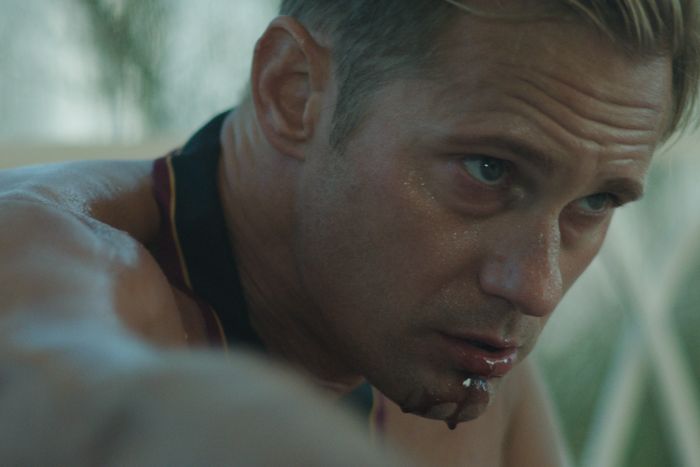
Infinity Pool takes place in the made-up country of Li Tolqa, which is poor and religiously conservative and home to a string of luxury resorts whose customers are neither. Played onscreen by parts of Croatia and Hungary, Li Tolqa is infused with a vague otherness that stands in for places all over the world where tourists exist in a different reality with different rules than that of the residents. At the Pa Qlqa Pearl Princess, where unsuccessful novelist James Foster (Alexander Skarsgård) is moping through a stay with his moneyed wife Em (Cleopatra Coleman), the staffers are smiling and solicitous. A local man barges onto the property, riding angrily up and down the beach in a quad bike — “Making a statement,” as another guest, Gabi (Mia Goth), observes archly. At first, the guarded, razor-wire-topped walls around the place seem to offer protection against hostility like that. But after James and Em fall in with Gabi and her partner, Alban (Jalil Lespert), repeat visitors who entice them on a day trip to a nearby cove, those fences feel less intended to keep the native Li Tolqans out than to keep the tourists in.
Infinity Pool is the third and the best film to date from Brandon Cronenberg, whose nepo-baby bona fides are obvious, but who’s also been admirably unafraid to invite comparisons to his famous father by working in the same sci-fi-body-horror realm. Cronenberg the younger does have his own obsessions, among them the idea of a sleekly globalized world traipsed through by the unmoored elite. His last film, the 2020 body-swapping assassin thriller Possessor, took place in an alternate Toronto, a pulsing yet oppressively generic corporate capital. All that commerce had denatured the city, leaving behind glass towers populated by a caste of nationless modern-day aristocrats and their retinues. Infinity Pool’s Li Tolqa is effectively where those same people would holiday. Over dinner at a Chinese restaurant run entirely by Li Tolqans, Alban reveals that he’s Swiss by way of Paris, while Gabi is from London, though they now live in Los Angeles, where he runs a journal called Glass Pane and she acts in advertisements. Em, Australian, and James (who has that flat American accent Skarsgård has plucked from no region that actually exists) are from the same privileged caste.
The details of Li Tolqan society, from its rainy-season feasts to its grotesque folk-art masks to the hallucinogenic root used for religious ceremonies, are regarded by these characters as quaint, as if the very idea of cultural ties were an archaic novelty. But when James accidentally hits and kills someone on the road back to the resort, all amusement at this different way of life evaporates, because federal law requires that he be executed by the dead man’s oldest son — unless James is willing to partake in the exception offered to tourists and diplomats. In exchange for a fee, James will be cloned right there in the brutalist confines of the police station, using a technology that is apparently unique to Li Tolqa, and his fully aware double will be slaughtered in his place while he bears witness. The spectacle horrifies Em, but James is captivated and comes up with an excuse to linger in the company of Gabi, who introduces him to a group of fellow “zombies” who’ve all watched themselves die at the hands of the Li Tolqan legal system.
Like Hugh Jackman’s Robert Angier in The Prestige, murdering himself again and again every night, the death of their doppelgängers seems to have exacted some incalculable, soul-rending price from these people. The bacchanal of group sex, substance abuse, and dreamlike violence the crew embarks on is fueled by the awareness that whatever atrocities they might commit, they can always buy their way out. Cronenberg has a taste for extreme imagery — early in the film (in the NC-17 cut, at least, though the version heading to theaters is R-rated), there’s a close-up of an ejaculating penis that’s mirrored later by a close-up stabbing that’s just as oozy with bodily fluids. Rather than frame these sights as provocative, he presents them with an impassivity that makes them more disturbing. The film’s woozy spectacles do eventually become numbing, as does Goth’s turn as the yowling ringleader, but that’s all in line with the experience. It wouldn’t be a real vacation if you weren’t ready for things to end at least a day before you’re scheduled to leave.
In addition to being a film about soulless jet-setters as a new form of walking dead, grounded in and caring about nothing, Infinity Pool is a phantasmagoric ode to the sensation of staying too long at the party. Though surely not intentionally, it feels like it signals an end to the era of getaway cinema that was ushered in by COVID out of necessity as much as of desire. Sending characters off to country houses or Mediterranean islands or beaches that make you old has been convenient for pandemic production as well as for responding to a widely felt desire to get away from the confines of our curtailed existences. Infinity Pool, much of which was shot in a hotel in Šibenik on the Dalmatian coast, is part of that recent tradition. And yet, after watching James try to get his mojo back through an increasingly surreal and sadistic odyssey through the fictitious Li Tolqa countryside, accommodated by workers and locals who have no other option, you’re left with nothing more than the feeling that maybe it really is time to go home.
More Movie Reviews
- The Accountant 2 Can Not Be Taken Seriously
- Another Simple Favor Is So Fun, Until It Gets So Dumb
- Errol Morris Has Been Sucked Into the Gaping Maw of True Crime


